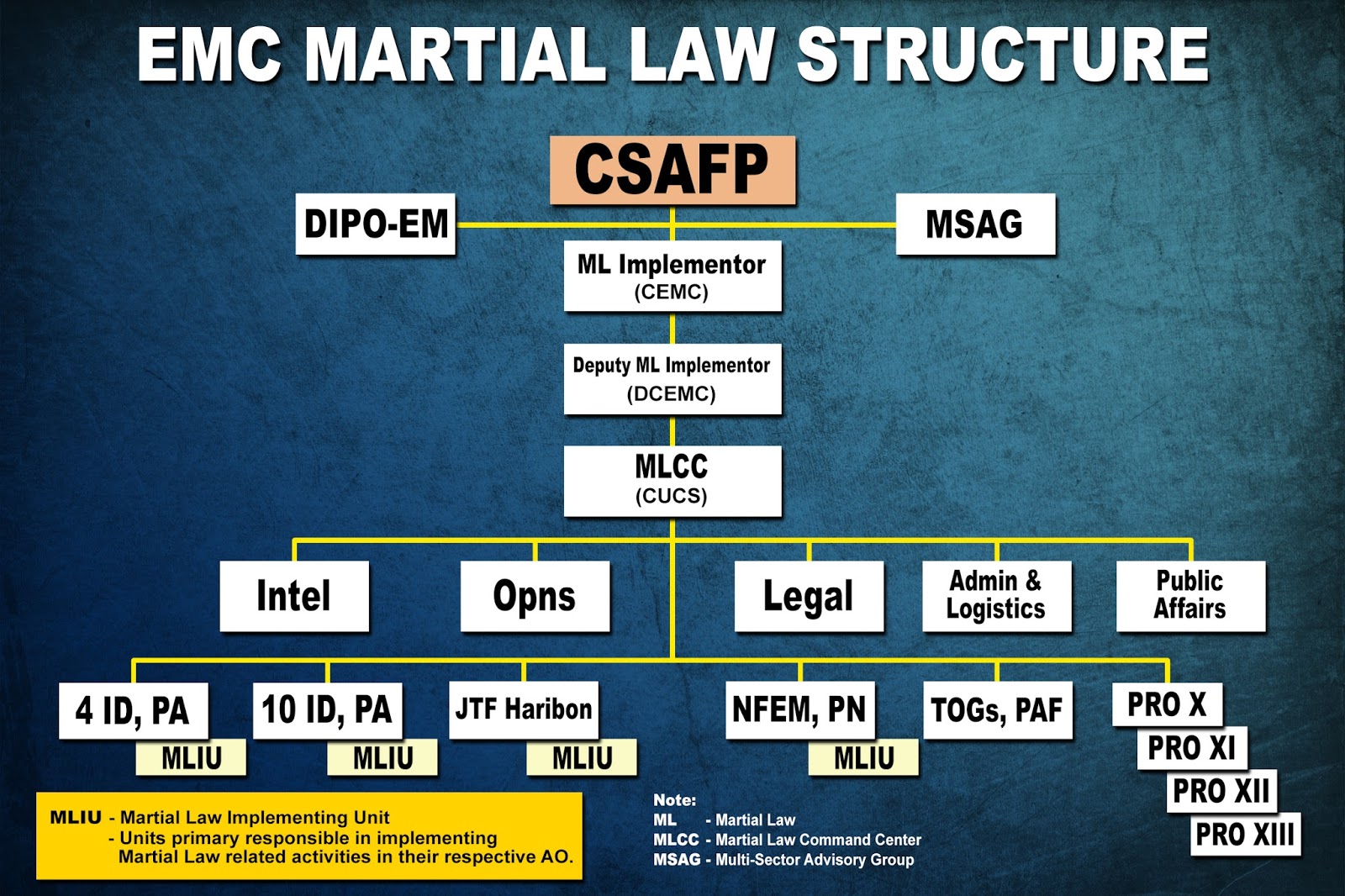
MARTIAL LAW STRUCTURE. Photo shows the structure that the Eastern Mindanao Command said will guide the implementation of martial law in its area of responsibility. (Photo courtesy of Eastmincom Info Office)
DAVAO CITY, Philippines – As the main body to implement martial law in this part of Mindanao, the Eastern Mindanao Command of the Armed Forces of the Philippines said it has activated a Multi-Sectoral Advisory Group to ensure accountability and transparency.
The MSAG, formed last May 30 at Eastmincom headquarters in Naval Station Felix Apolinario in Panacan here, is composed of representatives from various sectors in Eastern Mindanao, particularly from Davao Region.
These personalities include Sebastian Angliongto, MSAG chairperson from the business sector; Prof. Antonio Obsioma, member from the academe; Susan Palad, member from the religious sector; Antonio dela Cruz, member from the business sector; Jerry Francisco, member; Most Rev. Fernando R. Capalla, member from the religious sector; Prof. Hadji Balajadia, member from the academe; Datu Mussolini Sinsuat Lidasan, member from the religious and academe; Atty. Romeo T. Cabarde, Jr., member, legal; Ms. Akhzanuniza M. Alonto from the Mindanao Development Authority; Dir. Efren Elbanbuena, member, of the Philippine Information Agency in Davao Region; Atty. Rogelio Largo, member, Legal sector from the Integrated Bar of the Philippines-Davao; and Atty. Mary Ann M. Arnado, Legal sector from the Non-Government Organization.
The first meeting of the members of MSAG was focused on legal discussions, particularly on the do’s and don’ts in the implementation of martial law, said Major Ezra Balagtey, chief of the information office of Eastmincom in a statement.
The creation of legal quick reaction teams was also recommended to the IBP-Davao that will become part of the mechanism of ensuring that the rule of law will be adhered to and abuse will be prevented.
“When martial law was officially declared in Mindanao, we are already preparing for the creation of QRTs that will assist civilians who will become victims of abuses. Martial law is an extraordinary situation for the people of Mindanao,” said Atty. Arnado when interviewed by Davao Today.
Arnado said the state of martial law in Mindanao is already a reality as the government declared it, and as lawyers, IBP-Davao members see the necessity of creating QRTs.
“A week after the martial law declaration, we at IBP-Davao together with the Ateneo de Davao law school and human rights lawyers convened to discuss what we can do since the martial law will involve arrests, searches, and checkpoints,” she added.
Arnado said upon their final decision to create QRTs, they decided to coordinate with the Eastmincom, the command being the chief implementing body of martial law in the area.
“That was really a good timing because, during our coordination, Eastmincom said they are also forming the MSAG and will need people from the legal sector,” she added.
She pointed out that in the QRT, IBP-Davao will become volunteers to provide free legal assistance to civilians who will become victims of abuses during the martial law implementation.
IBP will also sponsor series of training for QRT volunteers and it is calling interested individuals and groups to join and be part of the response team that will ensure the transparent implementation of martial law in eastern Mindanao.
“We are already into this (martial law). The most important thing to do is how we can help,” Arndao emphasized.
ML implementation structure
Balagtey said Eastmincom has finalized the organizational structure that will guide the implementation of martial law in its area of responsibility.
“The structure that will ensure that guidelines and upcoming orders from the higher authorities will be adhered to by the command,” he stressed.
The structure also defined martial law coordination centers up to the brigade level of the command.
“Eastmincom will regularly update the public through meetings, gathering and other forms of communications for them to be aware of the situation on the ground,” he added.
Eastmincom also published two promotional brochures for the public, entitled: “Declaration of Martial Law” and “Martial Law and Violent Extremism.”
The Army has already started distributing said reading materials, he added.
The production of the reading materials was made possible with the support of the Philippine Information Agency.
The brochure “Declaration of Martial Law” explains invasion and rebellion as a ground for the declaration while the second brochure talks about Maute and the Marawi incident, Balagtey said.
It also quoted Article 134 of the Revised Penal Code and Article VII, Section 18 of the 1987 Constitution that provides the need for the president to report to Congress within 48 hours after the declaration, and for the Congress to act on the martial law proclamation and the need to be reviewed by the Supreme Court.
“The brochure also pointed out that martial law does not suspend the operation of the Constitution while emphasizing that the Judicial and Legislative branches of the government will continue to function with their civilian heads,” Balagtey said. (davaotoday.com)










